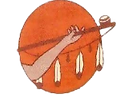Chronology
-
1699 First contact with Schaghticoke settlement reported to Governor John Winthro
-
1725 CT Council journal entry reads; A scout of 10 able bodied men depart through the wilderness to Housatonic and inform the Sachems that they look upon the Schaghticoke as friends
-
1729 CT General Assembly identifies land on the west side of Housatonic as a reserve for The Tribe
-
1744 Governor Clinton enlists the Tribe in support of English against the French. He describes Tribe as having 100 Warriors
-
1744 The Schaghticoke are the first Tribe listed in a 6 Nation Indian/ Clinton Treaty
-
1752 CT Assembly enlists Samuel Adams and Roger Sherman to survey present day Kent Ct, including The Schaghticoke Indian Reservation
-
1756 The Schaghticoke petition the Ct General Assembly for more land
-
1757 Colonial assembly appoints overseer for Tribe 1774 Schaghticoke men join the Continental army to assist George Washington as scouts in The Revolutionary War
-
1786 Schaghticoke petitions CT Assembly over The States refusal to assist Tribe
-
1801 Tribal overseer petitions CT Assembly to sell off Tribal land to pay Tribal debts
-
1804 Ct Assembly sells 600 acres of Schaghticoke reservation land
-
1846-1867 Execution of mortgage to Tribal overseer
-
1882 Article describing how Schaghticoke members are leaving Reservation due to economic stress
-
1900 New Milford Power floods Tribal burial grounds to build dam for hydro plant

-
Value Kilson attempting to remove graves from the second Schaghticoke burying ground before it was flooded by construction of the dam at Bull’s Bridge (Lucianne Lavin, Connecticut’s Indigenous, Yale University Press: 2013, pg. 356).
-
1925 Letter to Federal Commissioner of Indian affairs regarding reservation
-
1926 CT Park and Forest Dept. assumes responsibility for Schaghticoke reservation
-
1930-1947 Listing of accounting of Schaghticoke reservation fund are documented
-
1941 Jurisdiction of Schaghticoke Reservation is referred to The State Welfare Department
-
1947 Tribe files land claim with Indian Claims commission
-
1950-1959 Reservation Fund report is issued
-
1959 Update to supplement General Statute for Welfare Dept. to continue as overseer
-
1960 Welfare Dept. refuses to assist maintain tribal homes on the reservation, instead they issue a permit to burn down tribal homes as a fire drill

-
The later razing of the Kilson reservation home (Lucianne Lavin, Connecticut’s Indigenous Peoples-What Archaeology, History, and Oral Traditions Teach Us About Their Communities and Cultures, Yale University Press: 2013, pg. 356).
-
1961 Description of Tribal reservation fund issued
-
1969 State of CT inventories graves at Schaghticoke reservation
-
1973 The Schaghticoke spearhead the creation of The CT Indian Affairs Council
-
1975 The Schaghticoke file a claim for Kent school land in US District Court
-
1981 The Schaghticoke file a letter of intent for Federal recognition.
The following letter dated 1983, and enclosure, were sent to The Schaghticoke’ Attorney from Attorney John Crosskey regarding the response to The Schaghticoke petition for the return of their land from the Town of Kent, CT. The response was a proposal to return only a portion of the land held by the Town.
-
Letter from Schaghticoke Attorney to Tribe

-
Letter to Schaghticoke Attorney RE: Petition for Lands


-
1984 The Tribes attorney was contacted by Attorneys Day ,Berry and Howard . An offer was made by defendants to settle approx 1000 acres adjacent to Reservation, offer refused by Tribe. Negotiations continue until 1987 when an out of court agreement cannot be reached.
-
1987 Chairman Irving Harris loses re-election. He and 30 family members stop participating with Tribal business.
-
1991 Irving's nephew, Richard Velky, starts a tribal faction called the STN or Schaghticoke Tribal Nation. Velky is elected Chief for life, sends new constitution to State. This is rejected by State
-
1994 STN files Petition for Federal Recognition using the original letter of intent under (SIT) Schaghticoke Indian Tribe. The Schaghticoke Indian Tribe (SIT) protests this action. Files complaint in Court, the BIA, and with State Agencies The Schaghticoke (SIT) dispute Schaghticoke Tribal Nation (STN) claims with the State and Federal Government
-
2001 The Schaghticoke Indian Tribe (SIT) file a new letter of intent
-
2002 The Schaghticoke Indian Tribe files for Federal Recognition . Tribe assigned petition # 239
-
2003 Schaghticoke Indian Tribe (SIT) freezes petition after notice from federal Judge allowing any and all Schaghticoke history to be shared in either petition., SIT or STN The BIA considers the SIT and STN two Tribes with a shared history. The SIT as Historical and Legitimate Tribe has 300 yrs history, Genealogy and all original legal documents. By freezing petition, they keep all documents.
-
2004 STN denied recognition
-
2005 STN reapplies using Tribal roles from both Tribes, tells BIA both Tribes are one under STN leadership. The Schaghticoke Tribal Nation (STN) gains recognition
-
2006 SIT upon notice of STN recognition finds that their membership roles have been illegally used and protest. STN looses recognition
-
2016 The Schaghticoke (SIT) file a petition for recognition under the legitimate Tribal Leadership. This petition includes the members of the STN under an integrated and united Schaghticoke Indian Tribe
-
The petition for federal recognition was accepted by the BIA on March 6, 2022, and it was published in the Federal register
-
The BIA agreed to provide a Phase 1 review of the petition on June 30, 2023.
Notes
-
The Schaghticoke reservation land is held in trust by the State of CT. This is one of only 12 in America. 10 have already gained Federal recognition. Schaghticoke is one of two remaining un-recognized Tribes. The Bureau of Indian Affairs has recently rewritten acknowledgment requirements allowing for land in trust as evidence for Federal recognition. The non- intercourse act is very explicit with respect to reservation lands, and our land claims will be based on this Act. Our land claims will be instrumental in taking future land into trust
